
- •Наши рекомендации
- •Thatcher attends "coup plot' case
- •Putin's Atomic Boast
- •Plea not to judge Muslims by acts of extremism
- •Kodak to shed 600 uk jobs
- •World Trade Organization
- •Record fine for worker's death
- •China files lawsuit against Yukos
- •Scientist kept plutonium in garage
- •A foreign corner of an English field
- •Uk repatriates bodies of Chinese
- •Opec: The oil cartel in profile
- •Egyptians release Israeli 'spy'
- •Independent, 10 . 11 . 04 .
- •'Come bite me!' right...
- •'Treasure hunt' for bandit's loot
- •Thai protesters die in custody
- •Funny old world
- •Pupils suspended over airgun attack
- •Singapore to protect schools with guards
- •Naked man climbs into la jet
- •Hunt for missing golfing tourist
- •Military to help young offenders
- •'We're not all hooligans'
- •Shipwreck 'could yield billions'
- •Paddling policeman grabs record
- •Fact file: Nimrod Rl
- •Submarine issues call for help
- •Bird flu claims 147 tigers in Thailand
- •100 Million paper birds
- •Anglo-Saxon coin fetches 3230 000
- •Deadly typhoon tears across Japan
- •From Russia With Love
Egyptians release Israeli 'spy'
An Arab-Israeli man jailed in Egypt seven years ago on spying charges has been freed and returned to Israel. Azzam was exchanged with six Egyptian students arrested by Israel in August this year on suspicion of planning to abduct Israeli soldiers. "

He ... screamed 'I am born again'," a witness said, as Azzam passed through an Israel checkpoint. The moves follow a visit to Israel last week by Egypt's foreign minister and its influential intelligence chief. Azzam's imprisonment has been a frequent point of friction. And the prisoner
exchange deal may be a forerunner of better relations between the neighbours, our correspondent says. Azzam, an Israeli textiles worker, was convicted of helping to send news about Egyptian industrial cities to Israel's intelligence agency, Mossad. He was said to have communicated secret messages in invisible ink written on women's underwear.
24

25
A F T N E W S , 27 . 11 . 04 .
Ukraine MPs reject result of vote
Ukraine is gripped by a complex political crisis. The parliament has declared last Sunday's presidential poll invalid.
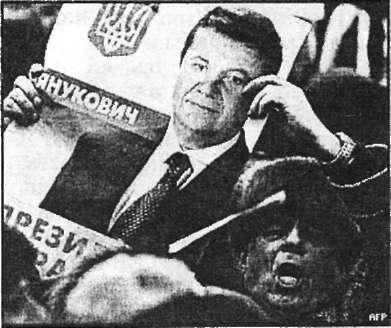
Members overwhelmingly backed a motion saying the election result was "at odds with the will of the people". Prime Minister Viktor Yanukovych was declared the winner, but challenger Viktor Yushchenko has alleged fraud and has called for a re-run. Parliament cannot overturn the result, but its views may carry weight with the supreme court. The court meets on Monday to examine fraud claims.
Parliament held an emergency session in the capital Kiev to discuss the crisis, and its proceedings were broadcast live on all national TV channels and to thousands of opposition protesters gathered outside the building. A majority of MPs also passed a vote of no-confidence in the country's Central Election Commission, which like the other vote was not legally binding.
Before the vote, parliamentary speaker Volodymyr Lytvyn told MPs the most realistic solution would be to invalidate the poll."The logical issue to be raised is to declare the election politically invalid because the true will of the people is now impossible to establish," he said. Dutch Foreign Minister Ben Bot - speaking for the European Union - said the "ideal outcome" would be to hold new elections before the end of the year.
The EU's foreign policy chief, Javier Solana, who has been taking part in mediation efforts in Kiev, has described last Sunday's vote as fraudulent, adding that relations with Ukraine depend on a democratic resolution.
Mr Yushchenko has called on his supporters, who have held massive protests in Kiev all week, to stay on the streets until they achieve "victory". Rival protests have been staged in the eastern city of Donetsk by supporters of Mr Yanukovych.
Shouting "Yanukovych! Yanukovych!" tens of thousands of people gathered in the city's main square on Saturday. Many of them say the eastern region of Ukraine would rather form an independent republic than accept Mr Yushchenko as head of state.
Mr Yanukovych and Mr Yushchenko held talks on Friday, but agreed only to set up a working group to discuss a peaceful solution. Independent observers, including some from the EU, have said the elections were flawed. Mr Yushchenko's party wants a repeat vote to be held on 12 December, under the supervision of the Organisation of Security and Cooperation in Europe. Mr Yanukovych has accused the opposition, which has been blocking access to government buildings, of attempting to stage a coup.
According to the official election result, the pro-Russian Mr Yanukovych won with 49.46% of the vote against Mr Yushchenko's 46.61%. The supreme court suspended the presidential poll result on Thursday to consider the opposition's complaints.
Last night Ukraine's presidential contest got personal when the two candidates went face to face in a bitter TV debate. It was broadcast nationwide. Under rules established by the central election commission, the candidates were allowed to ask each other questions directly. The confrontation remained civilised, but did not mask acrimony between the two.
Mr Yuschenko said he wanted to turn the population's attention to "the results of the November 21 election... stolen by my opponent and his team". He said that "160 criminal cases have been opened into this", and added that Ukraine did not want to live
under "criminal authorities".
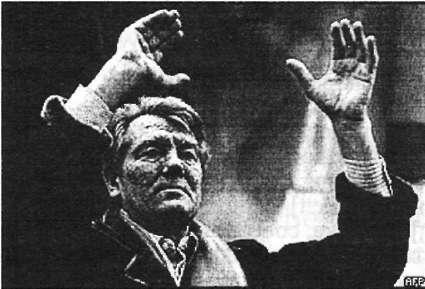
Mr Yanukovich began by warning of an "economic catastrophe" and accusing the outgoing president, Leonid Kuchma, of organising the "orange coup" - a reference to the colour worn by most of the protesters. (In recent days Mr Kuchma has been increasingly conciliatory towards Mr Yuschenko in the face of a likely opposition victory). "I am not struggling for power; I am struggling against bloodshed." he said.
26

27
O G U A R D I A N , 12 . 08 . 04 .
The Russians are coming
by James Meek
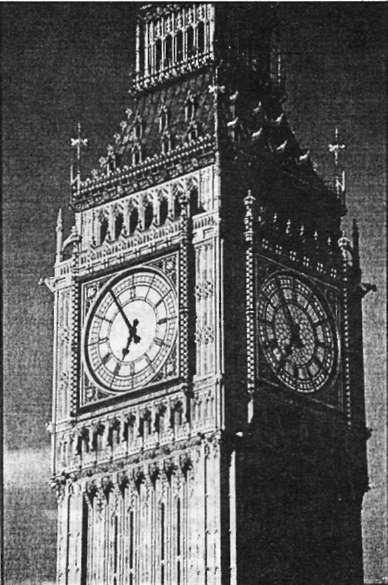
Camilla Mabbott strokes the wall and I do the same. The texture is smooth and cool and the look is a shiny, swirly mix of beiges. "We tend to do the walls in Venetian plaster. The Russians like this," says Mabbott. "It takes ages to do and it gives a lovely light at night."
Mabbott is marketing manager for the Candy brothers, designers of luxury flats for the very rich. She is showing me round a three-bedroom, two-storey flat in Mayfair, central London, on the market for a little over J5m. Mabbott won't say how many clients the Candys have, but two-thirds of them are Russians. "We have more billionaires than millionaires on our client list," she says.
The flat has a glass spiral staircase down through its centre, and lots of fittings in a dark timber called Wenge. All the doors in the apartment are covered in chocolate leather. The mega-rich Russians, says Mabbott, have high standards. "They'd freak out if they found anything was
veneer. We had one of the Russian oligarchs buy a property of ours about 18 months ago, and they tend to introduce us to their friends. It's largely down to word of mouth. Now they're saying, 'We want you to do our plane, we want you to do our yacht, we want you to come to Moscow and do our flat there."
The appearance on London's social scene of tycoons such as Chelsea football club's new owner Roman Abramovich and oligarch Boris Berezovsky, and in Moscow of branches of London estate agents catering to the very rich, has drawn attention to the rapid rise of Russians as the market makers at the top end of the house-flogging game. According to a survey by the estate agents Knight Frank published in the Mosow daily Izvestiya last month, every 15th property sold for more than half a million pounds last year went to a Russian buyer, and Russians bought every third property in London sold to foreign citizens.
Yet the tiny number of Russian super-rich is only one part of a sprawling, many-layered Russian-speaking diaspora which has in a strikingly short time become a significant new British minority. Just over 100,000 British visas of all kinds were issued to Russians last year, and the latest census figures suggest 41,000 people from the former Soviet Union have permanent residency rights here. Tens of thousands more are here as students, refugees, visa-overstayers or illegal migrants. Estimates of the total number are often given in six figures, but it is impossible to be certain.
In little more than a decade, a whole Russia in miniature has sprung up in London, with its own newspapers, bars, clubs, bookshops, schools, film screenings, parties and exhibitions. Russian food stores sell the stock list of classic Russian delicatessen: golden salt mackerel, kasha, kefir, waffles, frozen pelmeny, red caviar, condensed milk and, in an open cardboard box, loose, dried fish as chewy as boot leather, to gnaw with beer.
It's not just their grocery stores that announce their presence either. On a cold, windy Monday night, outside a scruffy building in west London, hundreds of Russians are queuing. This is the first time Yuri Shevchuk and his band DDT have played London, and although the Shepherd's Bush Empire isn't a sellout, the promoter, Yuri Stepanov, has managed to shift more than 1,200 tickets, overwhelmingly to Russians who are, like himself, now resident in Britain.
Before the show begins I chat to two couples in their 30s - Anya and Yura and Tanya and Oleg. The men have good jobs in the City; their wives bring up the children. In Wimbledon, where Anya lives, there is a Russian school.
"When we came here in 1997, there were very few Russians," says Anya, originally from Moscow. "Then, suddenly, the numbers shot up. I mainly socialise with other Russians, but the ties within the Russian community aren't very strong."
I ask about whether Russians suffer from British preconceptions about them. "They
28

29
say we all drink vodka," says Oleg. "I don't drink vodka." Yura is from Murmansk, home of the Russian navy's northern fleet. I ask if he's from a military family. "Ah, that's the second cliche," he says. "We all drink vodka, and if you're from Murmansk, you're from a military family."
Inside the theatre, in the status-conscious way of post-Soviet Russia, there's a special bar just for people who bought J40 "VIP" tickets. I buy one, hoping to bump into an incognito oligarch, but there aren't any. However, I do meet Lena Lagutenko, wife of Russian rock star Ilya Lagutenko, the lead singer of the band Mumy Troll. The Lagutenkos are from Vladivostok, but now they live in Wood Green.

"The Russians who decided to leave Russia have an extra half-chromosome that gives them a slightly different
way of thinking," says Lagutenko. "The Russians who came to Britain aren't like the Russian community in Germany or America. Those are ordinary people, people who came from the village. The ones who come here are more intellectual. They come to study or to work."
Lagutenko, who has gone into the gig-promotion business herself with veteran impresario Stuart Lyon, feels warmly towards Abramovich for raising the profile of Russians in London. She argues that Russians are more likely to assimilate than stay within their own community but there is, it turns out, plenty of association among notable British Russians. A friend who has been in the Abramovich box at Chelsea's ground Stamford Bridge describes the scene. "There's a buffet lunch with really fine smoked salmon and black caviar. The box is filled with Russians in business suits and they're just cheering away for Chelsea. They're really young, Roman's age, late 30s I guess. I get the feeling they're very happy to be in London among this wealthy set - and they're enjoying it. There's a kind of new crowd taking over the court' feel about it."
Yet the picture of Abramovich as the leader of a rich new Russian wedge in London, deter-minedly hammering its way into posh society, isn't entirely accurate. Although he has attended 44 out of 47 Chelsea games since taking over the club, his spokesman in Moscow, John Mann, insists that he doesn't live in Britain. "Sometimes he only flies for one day and back the next. The question is, is he resident in Britain full time? No." Although Mann confirms Abramovich's ownership of a flat in Lowndes Square, Knightsbridge - now on the market for J 5m - and 450 acres in West Sussex, he dismisses the notion that Abramovich is taking some arriviste's road to acceptance by the British establishment. "If you knew Roman, you'd know he doesn't really care about that kind of thing."
It is clear, of course, that not every Russian in London knows Roman. Reading through the London-info small ads, a very different world of Russian London emerges. In the "work offered" section there are half a dozen ads from "export agencies" seeking "young, attractive girls" with-out experience or English. In the "work required" there are almost 200 ads from Russians seeking jobs as cleaners, nannies, carpenters, labourers, waiters, cooks and private tutors.
Yuri Stepanov, a 52-year-old former musical child prodigy, is one of the small group of Soviet-era Russian emigres in London who has watched the Russian presence here broaden and deepen over the years. He first arrived in 1980, following a short-lived marriage to a British student whom he met in

what was then Leningrad.
"It was like going to the moon. I had no idea what awaited me," he says. "Our idea of Britain, even among advanced people - and I counted myself as one of them - was formed from the novels of Charles Dickens and Jack London and the few films that the Soviet censors
allowed us to see." Stepanov struggled to find work, then flourished, he has now found a niche playing terse, ruthless, unshaven Eurasian gangsters and terrorists on TV and in films such as the Jackal and Snatch; now he promotes Russian rock and pop.
"When I came in the 1980s, there were White Russians here, old families who came
30
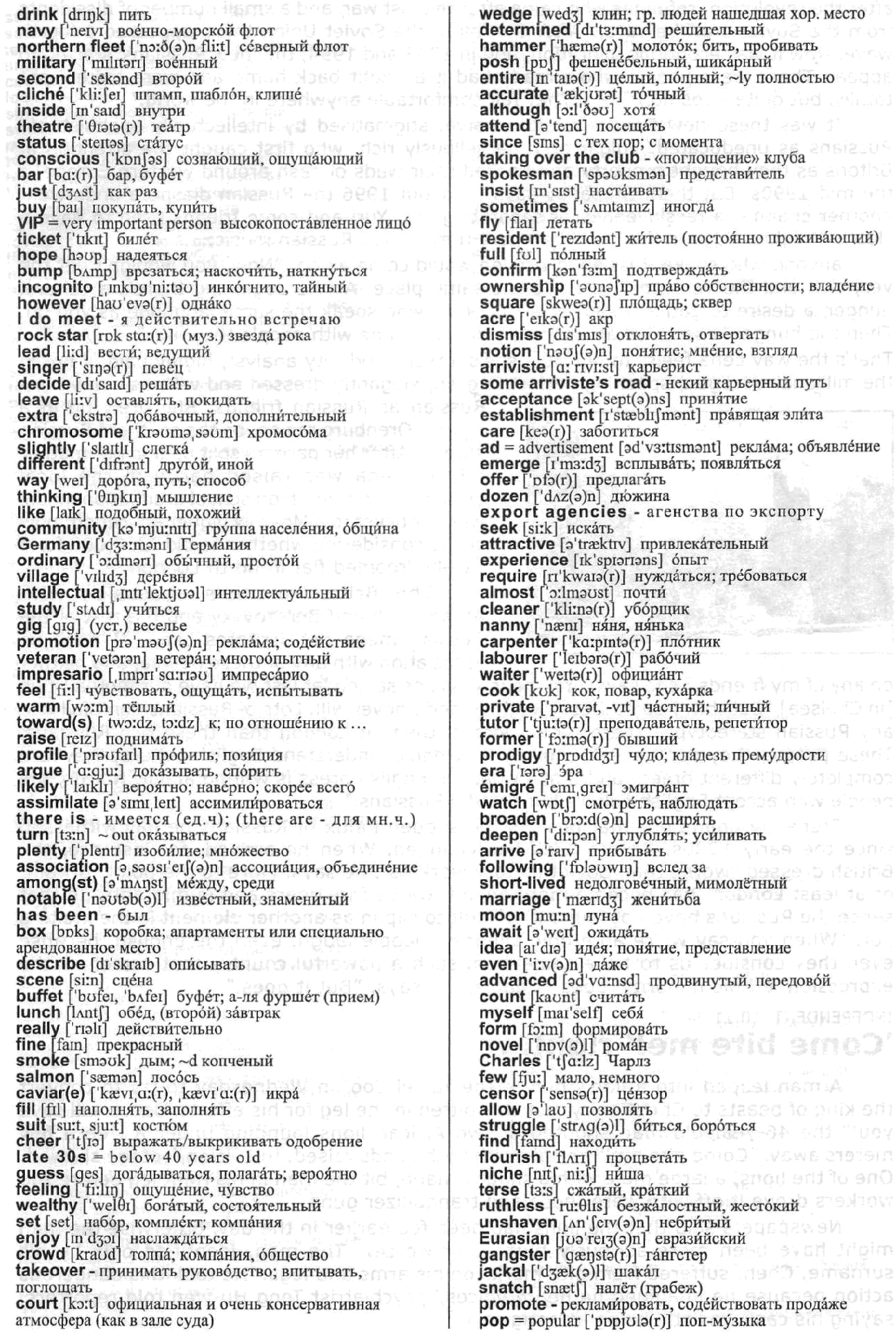
31
after the revolution, refugees who came after the last war, and a small number of dissidents from the Soviet era," he says. "After the fall of the Soviet Union there appeared a fourth wave. Now it was economic migration, and in 1993 and 1994, the 'new Russians' started to appear. These were people who already had it all right back home and were quite - not totally, but quite - cosmopolitan. They felt comfortable anywhere in the world."
It was these new Russians, often naive, stigmatised by intellectually snobbish old Russians as uneducated, vulgar and marvellously rich, who first caught the attention of Britons as they bought property and flashed their wads of cash around western Europe in the mid-1990s. But then, Stepanov says, in about 1996 the Russian diaspora underwent another change: a rassloyeniye, or separating out. Yuri and some friends used to have a club in Knightsbridge in the mid-90s where they played Russian music;
anyone who spoke Russian in London would come along. "Now, you wouldn't get the very rich and the very poor going to the same place. At the beginning there's a cultural hunger, a desire to gather together with people who speak the same language as you do. Then the hunger is satisfied and people just want to be with people they like."
That's the way Lena feels. In her 30s, she's a respected City analyst, highly paid, if not in the millionaire league, speaking perfect English, elegantly dressed and with as many non-Russian as Russian friends. She grew up in a town in Orenburg region, on the southern Russian steppe. After her parents split up and her mother fell ill, Lena was raised partly in the local orphanage. A silver high school graduation medal was her ticket to a Moscow higher education; now she is considering whether to bid J330,000 for a
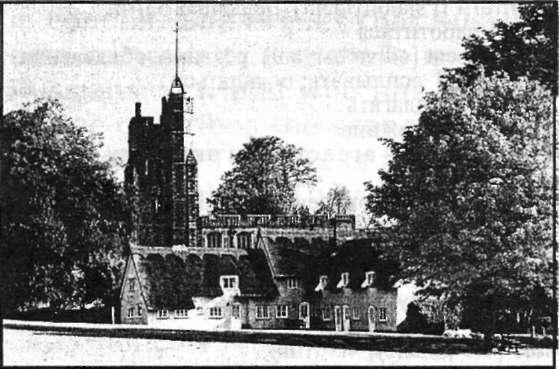
two-bedroomed flat in north London.
The British media's obsession with Abramovich and Berezovsky and the rest of the Russian mega-rich irritates Lena. "I have no association with any of these people, and neither
do any of my friends," she says. "You hear Russians saying 'at last we have our football club [in Chelsea].' Bullshit. I don't dress like them and I never will. Lots of Russians don't fall into any Russian stereotype. There's lots more of them in London than these rich Russians. These people, they don't speak English, they don't understand English culture, they're a completely different breed, and that's what the English press is writing about. Not us, the people who accept English culture but are still Russians."
Stepanov points out that besides the sudden influx of Russians he has witnessed since the early 1980s, Britain itself has changed. When he arrived, for instance, the British dressed "worse than Soviet factory workers", he says. More to the point, Britain, or at least London, has become more open towards foreigners and immigrants. In that sense the Russians have not found it difficult to slip in as another element in the melting pot. "When you say we're an ethnic minority, people laugh, even the English, because even they consider us to have come from such a powerful country that somehow the expression 'ethnic minority' doesn't apply," he says. "But it does."
